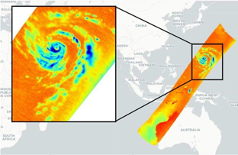PhD Life Experiences
Hannah Rogers has just submitted her PhD thesis at the University of Edinburgh and is a member of the IAGA Social Media team. Her specialism is in investigating regional magnetic fields of Earth at the surface and the core-mantle boundary using mathematical methodologies. In this blog, she tells us about her experiences during her PhD. You can follow her on Twitter at @Hannah_Rogers94.
I’ve really enjoyed my experience as a PhD student. This has mostly been due to the fabulous community of scientists I have had surrounding me during my research. My supervisors have been great at encouraging me to get involved in opportunities outside my project and I have developed so many skills to take forward in my career. My PhD has provided me with experiences I would not have had otherwise and I loved saying yes to them!
Assisting teaching undergraduate students has been an excellent use of my time. It gave me time away from my computer models and the chance to recap my geophysics knowledge outside of my main discipline. It is extremely satisfying to work with a student and watch the moment they grasp the concept they are struggling with and to know you have helped with their understanding of the world they live in. It’s given me confidence with explaining complex ideas and provided a structure during term time.
 |
| A very rainy electrical resistivity profile when teaching undergraduate students geophysical techniques in Shropshire, England. |
I undertook two industry placements during my PhD which provided me with the chance to learn new skills like grant writing for ESA industry funding, organising projects and working with different remote sensing data. It was useful to see how academia and industry varied, and have exposure to different sized companies. I developed coding skills in different languages and my understanding of machine learning.
 |
| High resolution passive microwave temperature soundings of Typhoon Hagibis from Orbital Micro Systems, 2019. |
I really appreciated meeting other graduate students within my department to provide perspective and friendship when times were tough during the PhD, and students from summer schools and other PhD programmes provided a way to broaden my knowledge and discuss ideas. I sat on a committee to run talks and social events for the Earth Science graduate community, which I absolutely loved! It was amazing to meet and work with scientists of all types from across Earth Science and give something back to the community that supported me.
 |
| University of Edinburgh Grad School Event |
Finally, working with the IAGA social media group has deepened my understanding of the magnetics community outside of the main field of Earth. I’ve met some really interesting scientists through this and feel like I am contributing to promoting the work of scientists in our field and creating a wider magnetics community.
My main pieces of advice for PhD students is to say yes to opportunities, build friendships with other PhD students (they are the only people who will understand the crazy roller-coaster you are on), and take time to rest in order to work at your best.


















